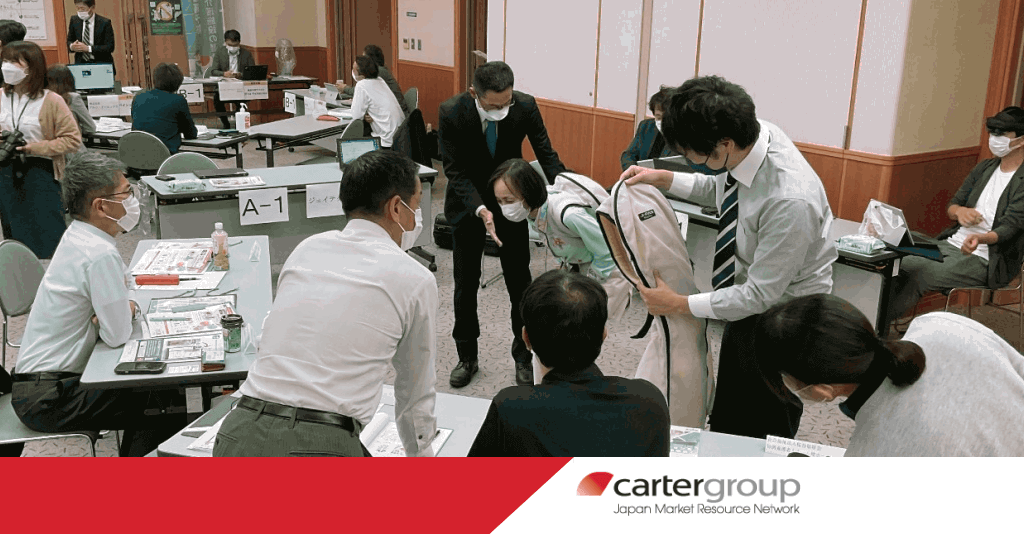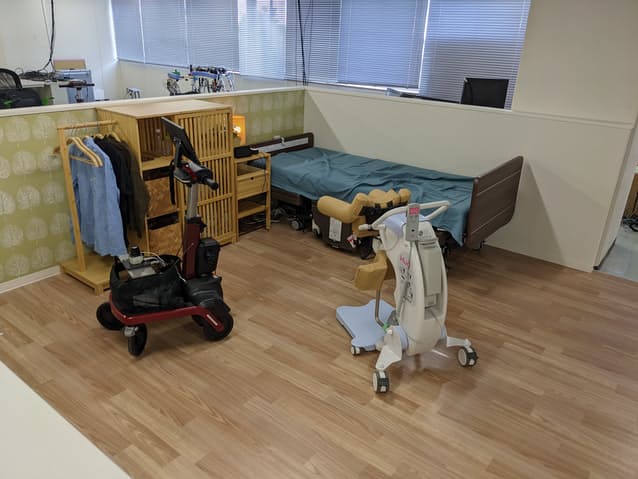With right at 30% of its population aged over 65, Japan represents the largest global market for ageing-related technologies. And with the proportion of over 65s headed to around 40% by 2050, the addressable market is only set to expand.
Recent surveys conducted by CarterJMRN show that across generations, a willing market exists for advanced assistive technologies designed to enhance the quality of life during ageing. In addition, Japan’s ageing population is largely financially secure, after a lifetime of saving for their future which has now arrived. Individuals – and all levels of Japan’s government – have the motivation and means to invest in improving their experience of ageing.
Yet, despite the massive business opportunity that age-tech represents, the sector is still in its infancy. Domestic businesses are working hard to meet the challenges (robotics quickly come to mind when thinking about Japanese technology), but nobody has comprehensively ‘cracked’ the solution to harnessing technology to improve quality of life for those who are ageing.
Consensus Between Public and Private Sectors That Open-mindedness is Critical
Due to the sheer prevalence and rapid progress of ageing, both individuals and government in Japan are open-minded to creative ways of addressing the goal, wherever the ideas come from. So with all this in mind, it is just as likely that practical innovations will also come from overseas in these pioneering days.
Kobe, a major regional city in western Honshu, Japan’s largest island, is keenly aware of the issues around the adoption of age-tech. Through its Kobe Biomedical Innovation Cluster (KBIC), the Kobe City government is positioning the city at the forefront of making medical and healthcare-related technology accessible to the Japanese people. Age-tech is viewed as a critical high human impact area that it wishes to support by welcoming foreign companies who are innovating in the field.
Why Kobe?
Kobe? You might ask. When most people think of the gateway to Japan, they think of Tokyo, Japan’s largest city. But the Tokyo area is not the only game in town when it comes to gaining market access to Japan. The Kansai region has a population of around 24.3 million people, representing the major cities of Osaka, Kobe and Kyoto – with a larger GDP than South Korea. The region is an important market for The Carter Group, which has had an office in Kansai since 2005. Kobe itself is famous for its natural beauty and high standard of living.
Identifying and Understanding Local Needs
The needs that contemporary Japanese seniors have – like the needs for ageing seniors globally – encompass everything ranging from cognition to mobility, from caregiving to wellness, and beyond. However, the challenges in making age-tech successful in Japan are more than simply creating helpful technology.
Solutions need to be conceived of, designed and delivered in a way that fit the way Japanese people live as they get older, as well as how they perceive their needs being realistically addressed. Placing clever solutions in front of people who don’t understand how to advantageously interact with them can be a recipe for these innovations gathering dust.
When it comes to age-tech innovations, human-centric design is not just a ‘nice to have’ element. Designing products with the user at the forefront of the process is essential. Further, as the late, great Peter Drucker put it, ‘Culture eats strategy for breakfast’. This is no less the case in the world of marketing technology in the area of ageing, especially when considering the need to adapt concepts to Japan. The interplay of practical, habitual and cultural factors makes success far from assured if approaching the Japanese market without the proper understanding.
In fact, there is a complex system affecting the adoption of technology. This involves the decisions the ageing person might make for themselves, as well as inputs from their loved ones and domestic caregivers and even as they progress, the institutions set up to care for them.
Along the way, there is a considerable amount of ‘tried and true’ wisdom as well as risk-averseness that can stand in the way of adoption. This includes the reality that there is a range of possible problems in design and implementation that may hamper caregivers as much as help them (even though the intention of introducing new technologies should make the work of care providers easier).
Enter KBIC and Its Progressive Initiatives
KBIC’s recently launched “Nursing Care Technology Introduction Promotion Project” its key initiative in ageing tech, and it aims to facilitate adoption of a broad scope of solutions, including those from international participants. Technologies that facilitate mobility, bathing, surveillance, emergency monitoring, communications, remote medicine, and cleaning are all envisioned as candidates for the program.
The project consists of several vital components, all of which are important to ultimate commercial success in Japan:
1. Consultation Services
Initial and ongoing consultation provides a window and facilitation service to ease international age-tech developers into the Japanese user and buyer universe. Global companies are supported through an improved understanding of Japanese systems, subsidies, and market trends that are critical to assisting them in achieving success in this unique market.
Moreover, KBIC is ready to help age-tech developer companies in securing complementary business partners, adapting their concepts, meeting Japanese user needs, organising product demonstrations, and advising on the development of sales channels. Participants are ultimately expected to open an office in Kobe, and naturally, to prepare product/service descriptions in Japanese-language.
2. Experiential In-situ Testing Ground
A particularly exciting component of the Nursing Care Technology Introduction Promotion Project is the testing ground for finished products and advanced prototypes provided through KBIC’s network of care providers. This is naturally also beneficial to the care providers because it allows them to experiment with solutions, as well as to understand the benefits and potential issues of the technology.
For age-tech developers, the program provides valuable user feedback that can be fed back into the design process. Further, participation in the program offers strong reassurance to future Japanese buyers that the solutions have been adapted to local needs. It is difficult to underestimate the value that building this kind of trust has on the willingness of the Japanese to do business with international companies. In addition, participation in the program and the demonstrable commitment and trust it builds can also be leveraged in public relations and promotions.
3. Involvement of Insurance Industry
Considering that a key stakeholder in the age-tech arena is the insurance industry, KBIC also sees it as critically important to use its program to expose insurers to instances where age-tech can be deployed. Insurers will physically tour care sites participating in the program and have the opportunity to speak with participants. The opportunity for insurers to engage meaningfully with care providers on their needs and existing pain points – and see potential solutions in action – is key to driving the entire sector forward. The program thus provides an unrivalled opportunity to expose international developer companies to Japanese insurers who can make or break the longer-term commercial story.
Finally, KBIC’s participation in domestic trade shows such as the yearly International Home Care and Rehabilitation Expo held in Tokyo provides a further boost to publicity and the forging of connections with key stakeholders in the age-tech universe in Japan.
A Win-Win for All Involved
All in all, participation in KBIC’s program provides massive benefits for age-tech developers from overseas who have aspirations of bringing their innovations to Japan. The value of experiential research alone amounts to many hundreds of thousands of dollars.
There is a range of practical issues, not the least of which is language, involved in smoothing the way for foreign participants. In this respect, The Carter Group, as a keen supporter and partner to the program, is happy to serve as a bridge between international companies and the City of Kobe. Please get in touch with Dominic Carter for further information.
If you haven’t yet downloaded our Age-Tech White Paper, click the link below!
Age Tech Japan Newsletter: April 2022
Age-tech in the News... <Infrastructure> When addressing the large-scale, multi-faceted challenges involving rapid aging, society, and healthcare systems, one of the most important success factors in innovating new solutions (and making them stick!) is...
Age Tech Japan Newsletter: February 2022
Social Media Usage provides Handy Barometer of Open-Mindedness to Age-Tech Products In this blog, CarterJMRN Representative Director and CEO Dominic Carter reviews the key findings regarding social media use from our Spring 2021 measurement. Social media use and...
Age Tech Japan Newsletter: January 2022
“Big in Japan – Perspective from 35 Years of Living in an Aging Country” Debbie Howard, Chairman of The Carter Group/Japan Market Resource Network, was recently interviewed by leading agetech innovator Keren Etkin (author of the recently released book “The AgeTech...



